Update: This article was last updated on 28th January 2026 to reflect the accuracy and up-to-date information on the page.
If you’ve ever found yourself struggling to remember what you studied or wondering how to improve your retention, you’re not alone. The secret to mastering memory and enhancing your learning might lie in one powerful technique: Active Recall.
In this blog, we’ll explore active recall, how it works, and why it is considered one of the most effective study methods backed by science.
What is Active Recall in Studying?

When it comes to studying, active recall is an absolute game-changer. Why? Because it shifts the focus from just reviewing notes to actively retrieving and testing what you’ve learned. This practical technique doesn’t just help you memorize facts; it helps you understand and apply the material better, making it a feasible and manageable study technique.
Instead of passively rereading your notes, active recall challenges your brain to recall the information from memory. This retrieval process strengthens the neural connections involved in memory, which makes the information stick. When your brain actively works to recall data, it enhances retention over time.
UCLA research found that students who practiced active recall experienced an increase in retention rates of up to 300% compared to students who relied on passive study methods like rereading and highlighting. This demonstrates how active recall can significantly enhance memory retention, providing reassurance and confidence in its application.
Active Recall vs. Other Study Methods: What’s the Difference?
It’s easy to fall into the trap of relying on traditional study methods like summarizing, highlighting, or just rereading textbooks. But how do these methods stack up against active recall study methods? Let’s break it down:
- Highlighting: While highlighting seems practical, it’s still a passive method. You’re marking essential points, but your brain isn’t actively working to retrieve the information.
- Summarizing: Summarizing your notes or reading the material over again can help reinforce it. Still, it doesn’t match the power of active recall, which forces your brain to engage in retrieval practice.
- Active Recall: Active recall, on the other hand, is all about retrieval. It strengthens memory by forcing your brain to recall information without looking at the answers right away, making it far superior to passive methods. This empowerment in your study approach can boost your confidence and make learning more effective.
In a study by Roediger & Butler (2011), students who used active recall scored 80% higher on retention tests compared to students who used rereading and summarizing as study methods. This statistic underscores how active recall dramatically outperforms other, more passive techniques.
How to Use Active Recall Effectively: Practical Tips for Better Study Results
Active recall is most effective when used correctly. Here’s how you can start implementing it in your study routine:
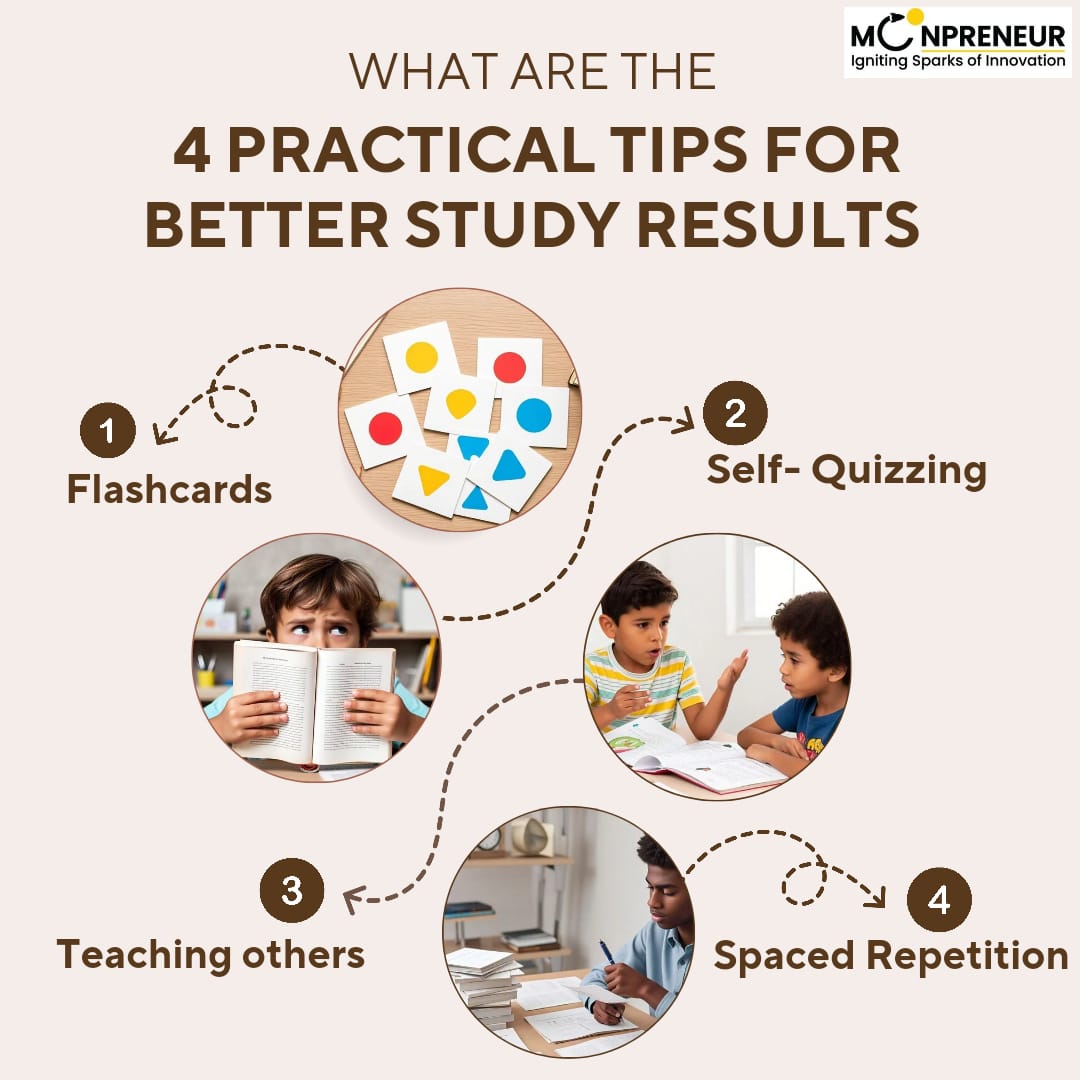
Recommended Reading: Kids Parachute Games: Active Playtime
- Flashcards: Write questions on one side and answers on the other. Regularly quiz yourself on the material. This method is one of the best ways to actively engage with what you’re learning.
- Self-Quizzing: After studying a chapter or section, close your book and try to recall as many details as you can without looking at your notes. This forces you to test your memory.
- Teach What You’ve Learned: Try teaching the material to someone else. Explaining concepts aloud helps reinforce the information in your mind.
- Spaced Repetition: Combine active recall with spaced repetition. This means reviewing the material at increasing intervals (e.g., after one day, one week, one month) to solidify it in your long-term memory.
A study by Cepeda et al. (2006) showed that using spaced repetition combined with active recall can increase retention by up to 75% compared to traditional study techniques. This combination is particularly useful for long-term retention and mastering complex subjects.
Interactive Activity: Master Active Recall with Flashcards
Now that you’ve learned how to use active recall effectively, it’s time to try it for yourself! Here’s an easy interactive activity to get you started with active recall using flashcards:
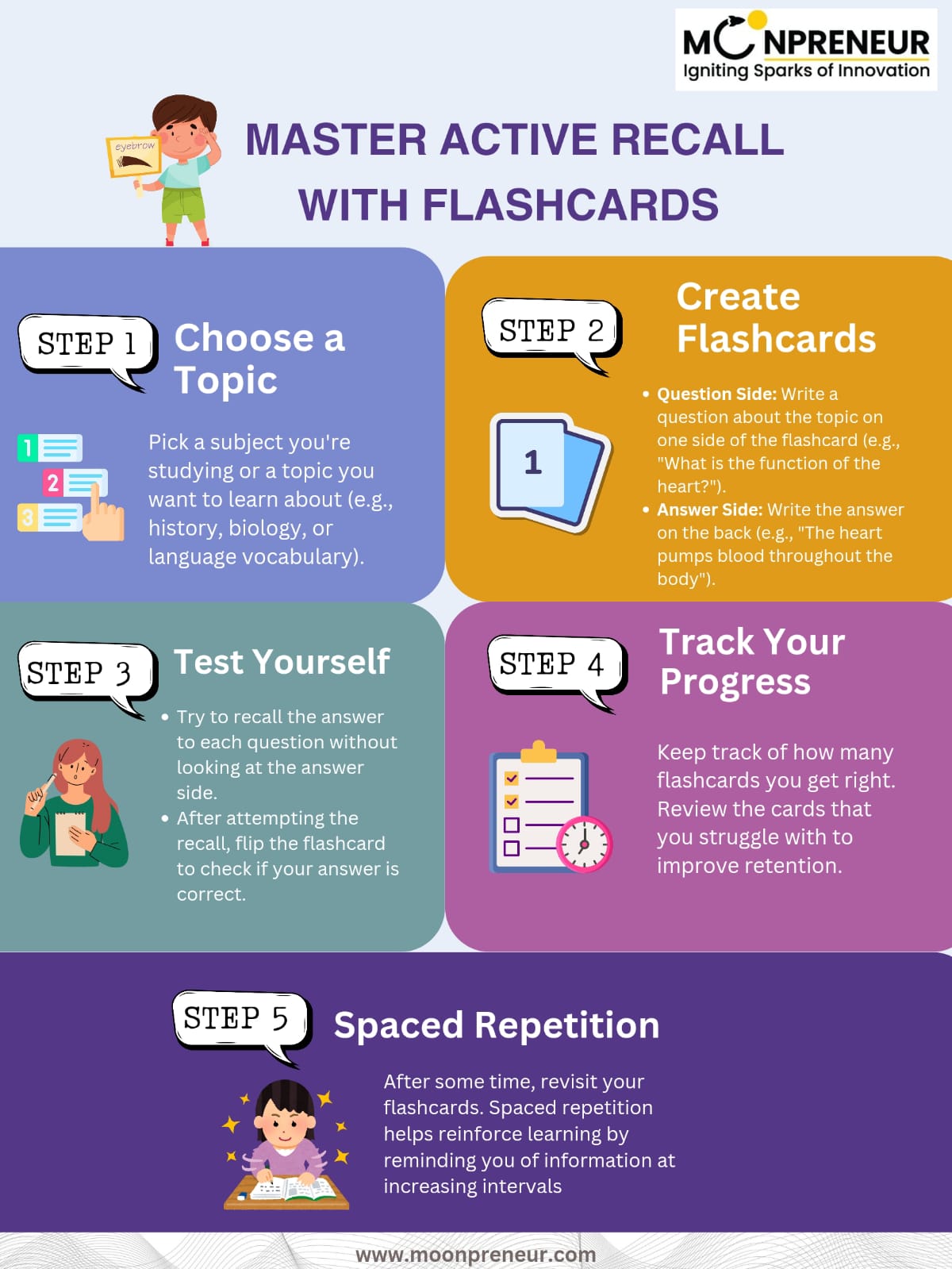
The Science Behind Active Recall: Real Case Studies
To understand its true power, let’s look at several case studies that demonstrate its effectiveness in real-world academic settings. These case studies not only illustrate the impact of active recall but also provide statistical insights that emphasize its superiority over traditional study methods.
Case Study 1: Active Recall in Medical Studies – Boosting Exam Performance at Harvard
A research study conducted by Harvard University focused on the impact of different study techniques on medical students. The students were divided into two groups: one group practiced active recall techniques, such as self-quizzing and retrieval practice, while the other relied on more traditional methods like rereading and summarizing notes.
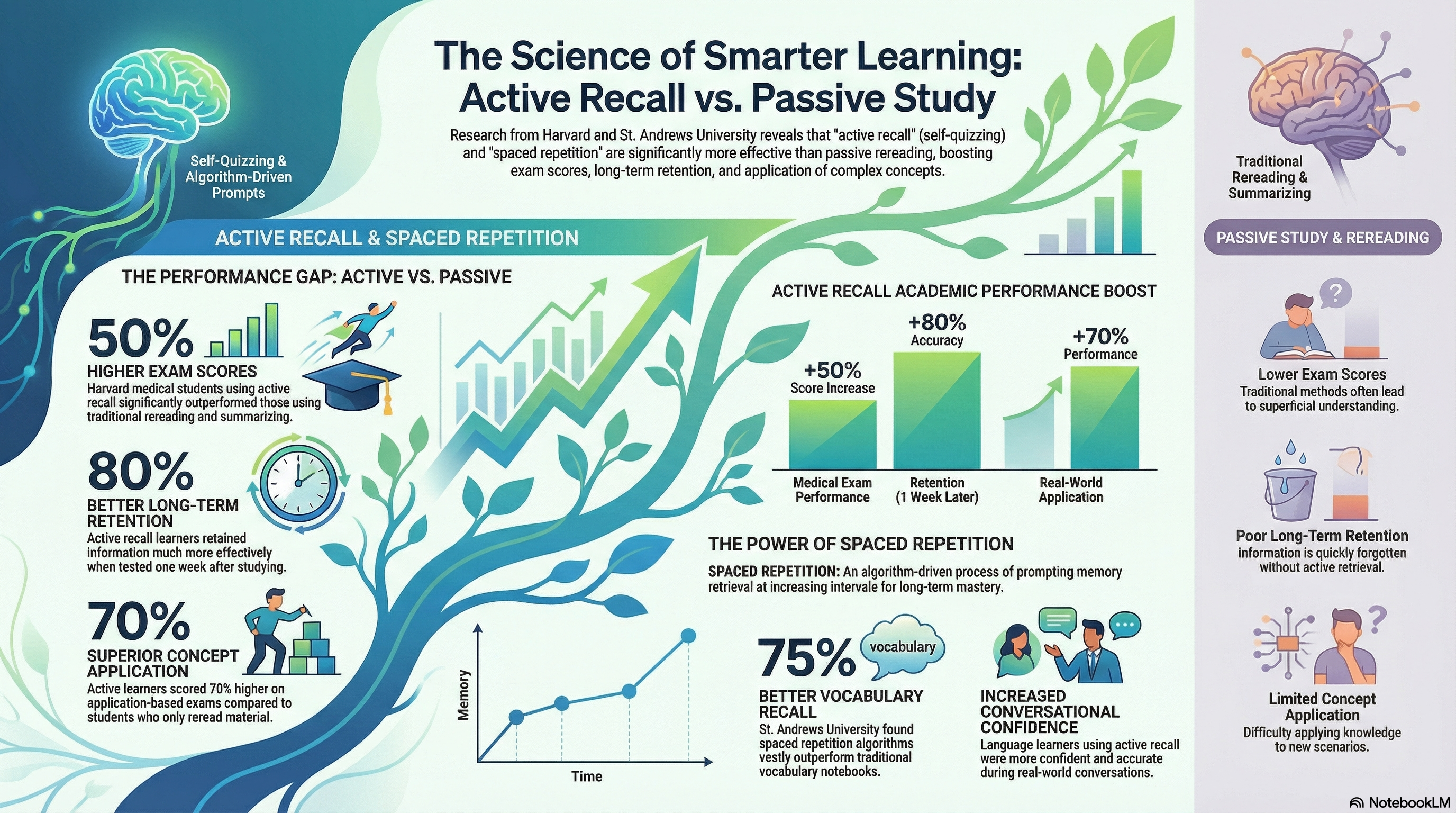
Results: The group that practiced active recall performed significantly better on their final exams. Specifically, they scored 50% higher on average compared to the group that used passive study techniques. The active recall group also reported feeling more confident in their ability to retain complex medical terminology and concepts.
Key Takeaway: Active recall helped medical students retain information much more effectively than traditional study techniques. It’s not just about memorizing facts; it’s about reinforcing knowledge through active engagement, which leads to long-term retention.
Case Study 2: Active Recall vs. Rereading – Psychological Science on Study Techniques
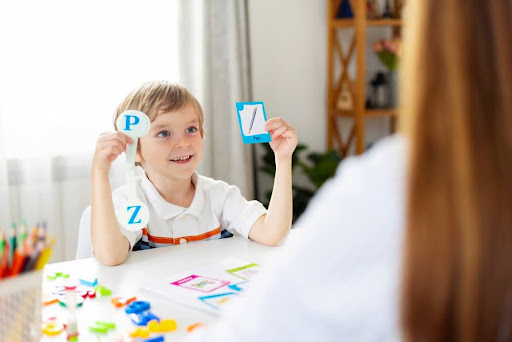
A research study conducted by Harvard University focused on the impact of different study techniques on medical students. The students were divided into two groups: one group practiced active recall techniques, such as self-quizzing and retrieval practice, while the other relied on more traditional methods like rereading and summarizing notes.
Results: Students who used active recall performed 80% better on retention tests administered one week after the study sessions. Additionally, when given an application-based exam (where they needed to apply the concepts learned), the active recall group scored higher by 70% compared to those who only reread the material.
Key Takeaway: Active recall significantly improved retention. More importantly, it enhanced the students’ ability to apply knowledge in real-world scenarios, a skill that’s critical for professionals like doctors, lawyers, and engineers.
Case Study 3: Anki Flashcards and the Power of Spaced Repetition in Language Learning

Recommended Reading: Experiential Learning: Why Is It Important for Students?
An independent research team from St. Andrews University examined the use of the Anki flashcard app (which incorporates both active recall and spaced repetition) for learning a foreign language. In this study, participants were asked to learn new vocabulary using Anki’s spaced repetition algorithm, which integrates active recall into the review process by prompting users to recall words at increasing intervals.
Results: The results showed that participants who used spaced repetition combined with active recall had 75% better retention rates after just 6 weeks compared to those who used traditional language-learning methods like word lists or vocabulary notebooks. Not only did these participants recall words with greater accuracy, but they were also able to use the vocabulary in conversation with more confidence.
Key Takeaway: Active recall combined with spaced repetition makes for an incredibly potent memory retention tool. This study’s results suggest that using apps like Anki can significantly enhance one’s ability to retain and recall vocabulary over the long term.
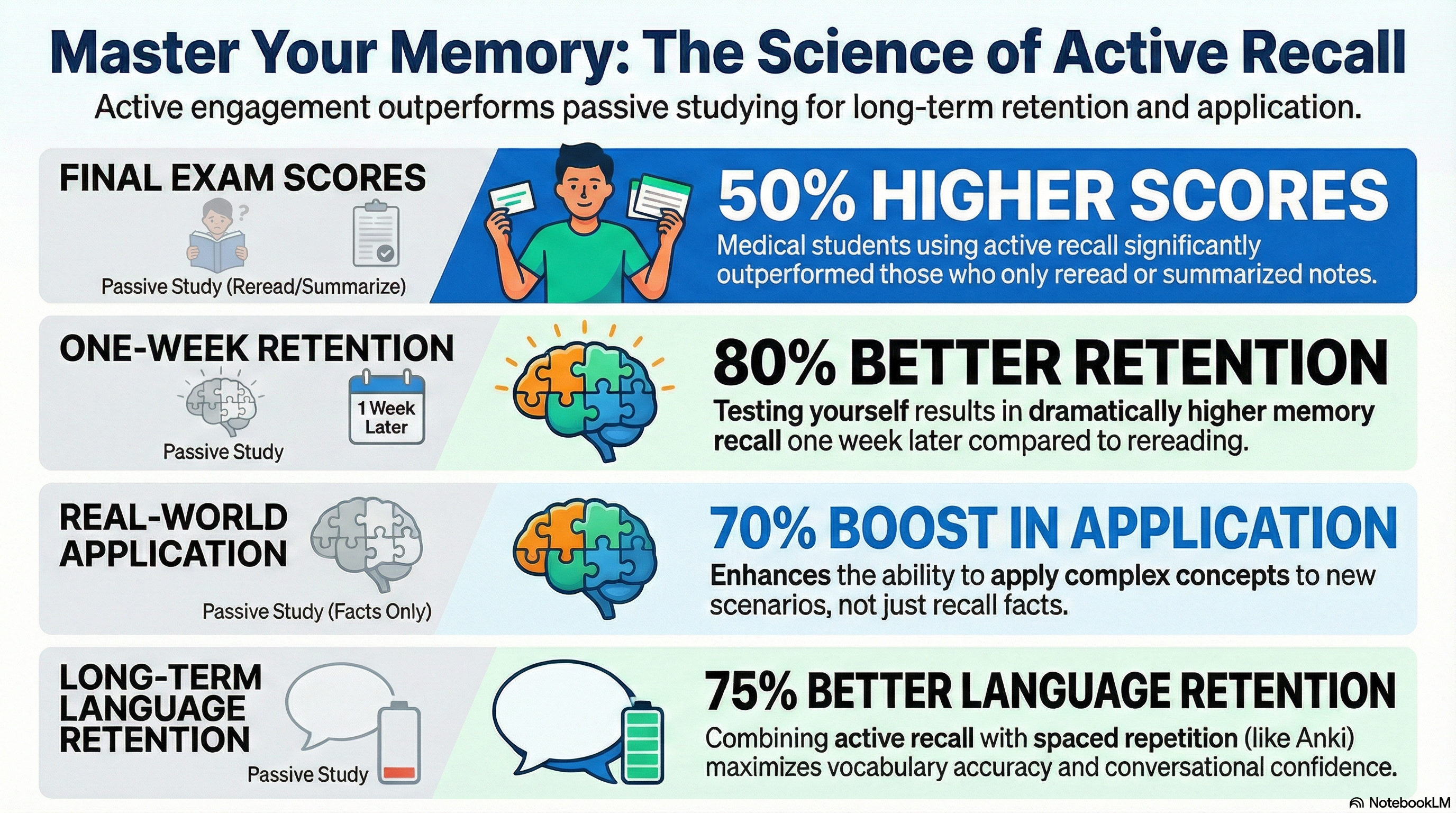
Overcoming Challenges with Active Recall
While active recall is incredibly effective, it can be challenging. The mental effort involved in retrieving information can be exhausting, and it’s normal to face challenges when starting. But don’t worry—you can overcome them!
| Challenges | Solutions |
|---|---|
| Mental Fatigue from Active Recall | Take breaks between sessions. Use the Pomodoro technique (25 minutes of focused study followed by a 5-minute break). |
| Difficulty Remembering Information | Break down material into smaller chunks and focus on one concept at a time to avoid overwhelm. |
| Inconsistent Practice | Set a regular study schedule to ensure consistency. Use apps like Anki or Quizlet to remind you to review regularly. |
| Lack of Immediate Feedback | Use flashcards or self-quizzes, and ensure you check the correct answers after each retrieval attempt. This helps reinforce learning. |
| Overloading with Too Much Material | Start with a few concepts or flashcards, and gradually increase the difficulty as you master each one. Focus on high-priority areas. |
| Difficulty with Self-Testing | Begin with simple, short questions, and gradually increase complexity as you improve. Use spaced repetition for more effective learning. |
Conclusion: Why Active Recall is the Ultimate Study Method
In conclusion, active recall is an incredibly powerful learning tool that can drastically improve memory retention, enhance understanding, and boost academic performance. Whether you’re studying for an exam, learning a new language, or mastering complex concepts, incorporating active recall into your study routine will help you achieve better results.
By utilizing active recall techniques such as flashcards, self-quizzing, and spaced repetition, you can ensure that the material you study stays with you for the long term. So why not give it a try? Start applying active recall to your studies today, and watch your memory and learning skills soar! Feel free to ask your queries in the comment section below!
Moonpreneur is dedicated to transforming conventional education, preparing the next generation with comprehensive learning experiences. Our Innovator Program equips students with vital skills in AI/ML, Robotics, Coding, Game Development, and App Development, fostering entrepreneurship through hands-on learning. This initiative aims to cultivate the workforce of tomorrow by integrating innovative technologies and practical skills in school curriculums.
Register for a 60-minute free workshop today!


























I recently encouraged my daughter to try active recall while studying for her history test. Instead of rereading her notes, she quizzed herself on key dates and events. Not only did she remember more, but she also said it felt like a game. It’s great to see how this method builds confidence and sharpens memory!
The interactive activity mentioned about using flashcards to practice active recall is such a practical idea! I’ve found that pairing this with a timed challenge makes it even more engaging for kids. It turns studying into a game while reinforcing memory.